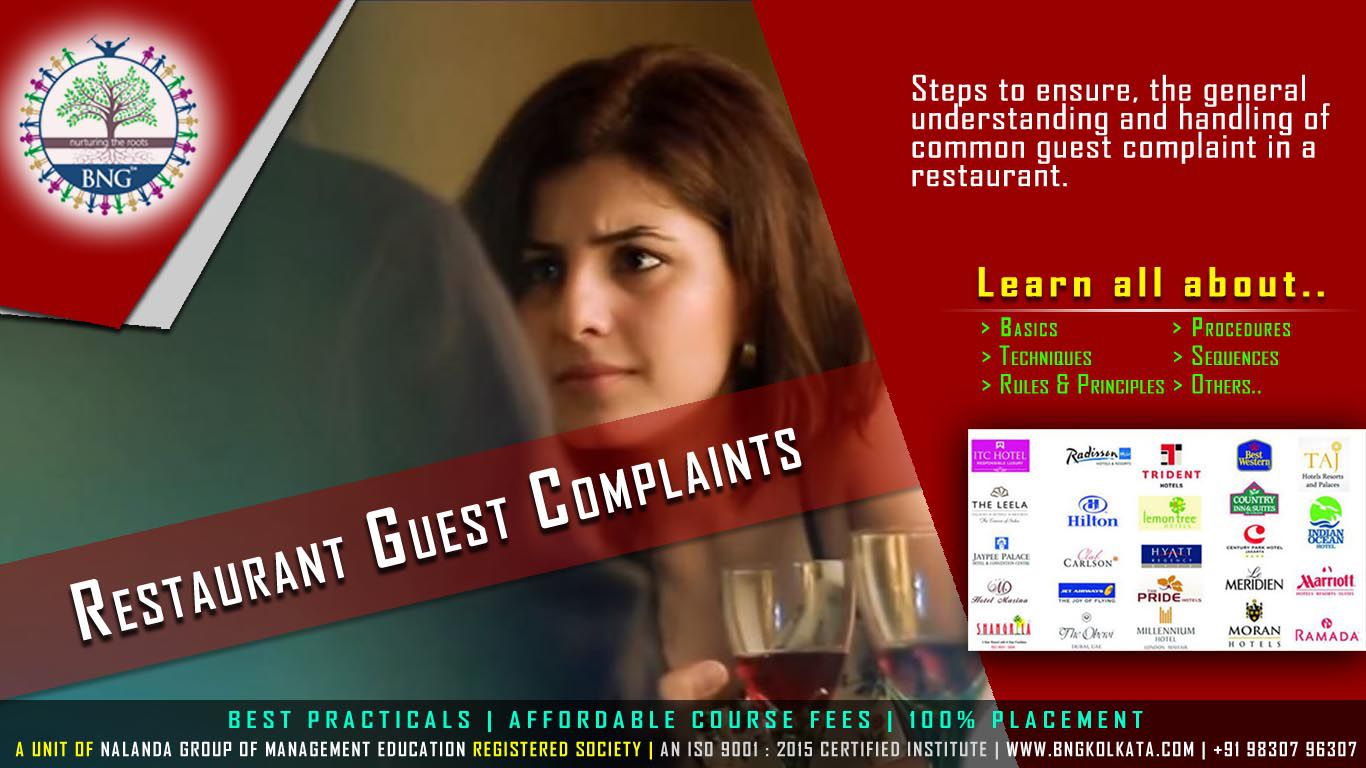
Restaurant Guest Complaint
Restaurant Guest Complaint
To ensure, the general understanding and handling of common guest complaint in a restaurant.
A guest complaint is:
- A valuable source of market information.
- A good sales lead.
- To indicate a “negative” variance in our quality or procedures.
- To avoid negative word-to-mouth publicity communicated to the outside environment.
- An opportunity to improve our service quality in general.
Dealing with an angry guest complaint
If you are in a public contact position, chances are that you will from time to time encounter angry customers. If angry customers are not handled effectively, they may remain angry, refusing to do business with our company and they will also probably have made you angry and upset as well.
Learning to deal effectively with angry customers will help you feel better about yourself, it will increase your job satisfaction, it will help your organization keep customers satisfied and get their repeat business and finally it will help you succeed in your job.
Recognizing an guest complaint
Basically there are two kinds of guest complaint: those who aggressively express their anger, and those who passively express their anger. It is not hard to recognize aggressively angry customers, they express their feeling immediately and their anger and hostility is obvious. Recognizing the passively angry customer is a little more difficult. The passively angry customer keeps his or her anger on the inside. The passively angry customer reveals his/her anger non-verbal and verbal actions.
Some of the non-verbal actions may be:
- impatient tapping of fingers or feet
- a flushed jaw
- clenched jaw
- rigid posture
- the avoidance of eye contact
Apology Policy for guest complaint
It is the imperative and paramount of improving service, food and the quality of procedures constantly and efficiently. Guests will assist us in that by giving recommendations, information and of course complaints if they feel a negative variance/inconsistency in our “quality” or standard.
To resolve, improve and receive a negative comment most effectively and efficiently, the person responsible for causing a problem must face the customer by him/herself. This is the only way where we can make sure that associates, regardless of positions, have understood and received a customer complaint as effectively as possible, and as a result customer complaints will decrease.

Dealing with a guest complaint
Once you have recognized an angry guest complaint, the two major steps are:
1. Deal with the person’s feelings
- Empathize
- Ask questions
- Give feedback
- Summarize
2. Deal with the person’s problem
- Find out what the person wants
- Suggest alternatives
- Share information
- Agree on solution
- Follow up!
Deal with the person’s problem
Find out what the customer wants
The first step in dealing with the person’s problem is to find out what the person wants you to do. How do you do that? By asking.
Suggest alternatives
Sometimes you won’t be able to do exactly what your customers want you to do. If you can’t explain why you can’t and tell them what you can do that is closest to what their asking for.
Suggest alternatives, allow your customer some choice and help them save face and feel that they’ve participated in the outcome.
Share information
Share information about your company’s policies and procedures. This will help your customer understand what you are authorized to do. When you share information with the customer, don’t give them too much. Be brief and tell them only what is relevant to their situation.
If you can’t resolve the problem, refer it upwards to the manager or supervisor. Never refer the customer “sideways” to someone at your own level. That would only make the customer feel that they are being shuffled around.
Agree on a solution
After discussing the problem and the different alternatives for solving it, you and your customer should agree on a course of action. Recommending a course of action shows your concern and will help the customer make a decision.
Follow up
Follow up allows checking that the solution to your customer’s problem has worked and that the customer is in fact satisfied. During the follow up you should try to make the customer feel important.
Five steps for handling guest complaint
- Listen and be open-minded, acknowledge by nodding your head that you listen properly and receive the message accordingly.
- Respond with concern. Show them that you care.
- Decide on actions based on your level of Authority.
- If the complaint is out of your area of responsibility call your supervisor or manager for help
- Take action promptly/immediately. An “entertainment” might be a good solution at this point, based on your level of Authority.
- Follow-up – is the customer satisfied and happy?
Is the problem corrected? If yes, job well done, if not return to the customer and find-out why not, contact you Supervisor or Manager as well.




